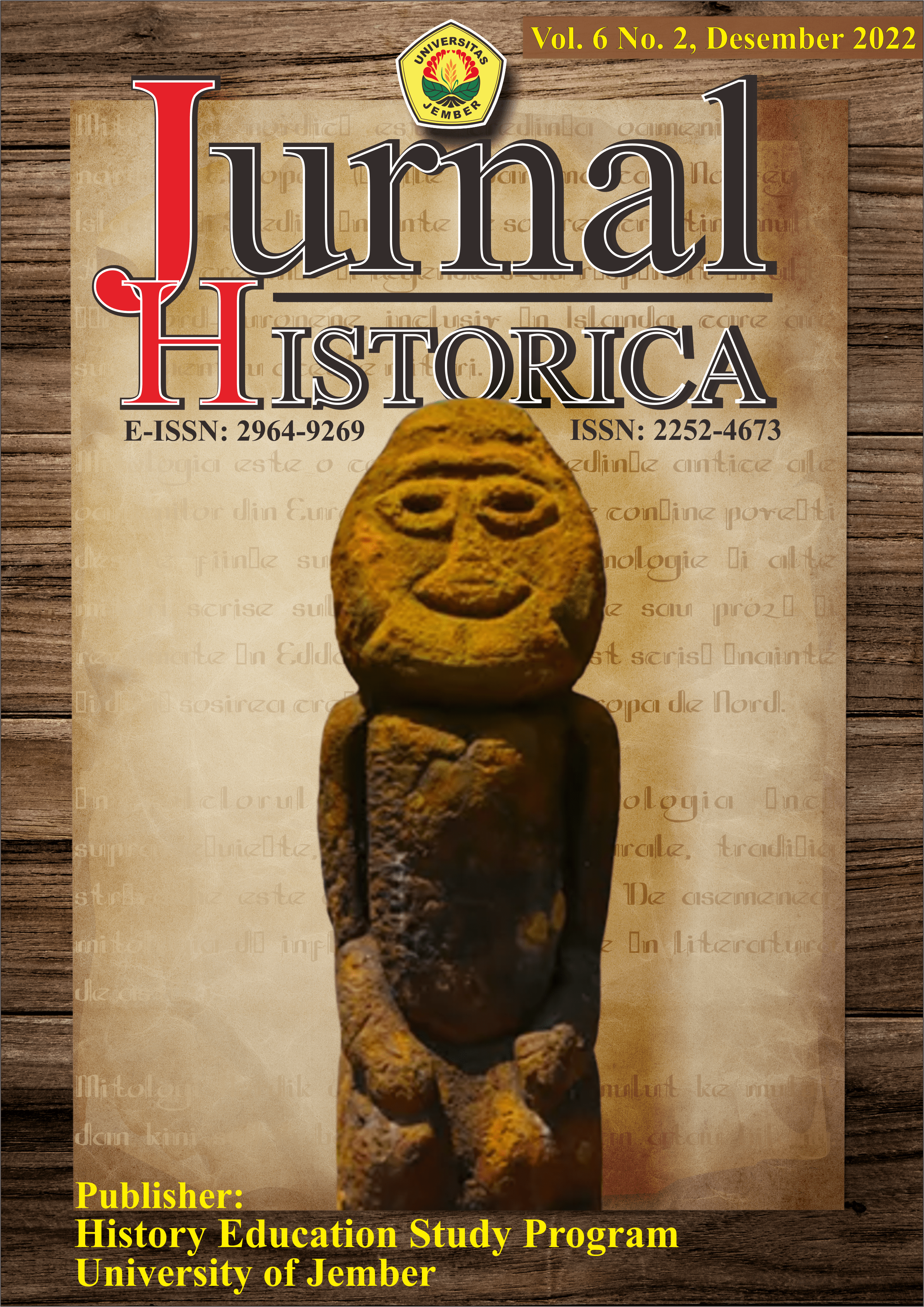Dynamics Of Social Life-Economy Of Ex-Tapol In South Blitar 1968-2000
DOI:
https://doi.org/10.19184/jh.v6i2.32697Keywords:
Socio economic life, former political prisoner, BlitarAbstract
This article examines the life of Ex-Tapol in South Blitar and the survival efforts amid the new order government's discriminatory regulations against Ex-Tapol. The Study is discusses (1) what are the supervisions carried out by local governments that affect the social life – Economy of Ex-Tapol, (2) how the dynamics of the social - economic life of Ex Tapol in South Blitar 1968 - 2000. The method used in this study is a historical research method. The method used in this study is a historical research method. Use document sources, interviews, and supporting secondary sources. The results of this study are: Local government supervision of Ex-Tapol including the mandatory reporting policy, disenfranchisement of civil rights and political rights, and provision of a special code (ET) on the ID cards of ex-tapols. Many former Tapol in South Blitar worked as a farmer. The existence of a regulation that Ex-Tapol and his descendants are prohibited from having certain jobs and are prohibited from being civil servants makes Ex-Tapol in South Blitar have no other choice, but to become a farmer. The income as a farmer is uncertain, making some ex-Tapol in South Blitar increase their income by raising livestock such as cows, goats, and chickens. The interaction of Ex-Tapol with the surrounding community is partly closed because of the stigma that the Ex Tapol PKI which is an enemy of the state made some people in South Blitar choose to stay away from Ex Tapol and are reluctant to have a relationship with Ex Tapol.
Keywords: Socio economic life, former political prisoner, Blitar
Downloads
References
Badan Pusat Statistik. (1987-2000). Kecamatan Wonotirto dalam angka tahun 1987-2000. Blitar: BPS Kabupaten Blitar
Gottschalk, L. (1989). Mengerti Sejarah. Terjemahan Nugroho Notosusanto dari Understanding History: A Primer of Historical Method. Jakarta: Universitas Indonesia Press.
Intruksi Mentri Dalam Negri No 32. (1981). Pembinaan dan Pengawasan Terhadap Bekas Tahanan dan Bekas Narapidana G 30/S PKI. 22 Agustus 1981. Jakarta: Departemen Dalam Negri Republik Indonesia.
Jawa Post. Eks Tapol G 30 S Boleh kembali ke Profesinya. Jakarta. 12 Agustus 1982.
Jawa Post. Tidak boleh bertransmigrasi Eks Tahanan G 30 S/PKI. Jakarta. 20 September 1982.
Keputusan Presiden No.28 Tahun 1975. Perlakuan terhadap Mereka yang Terlibat G.30.S/PKI Golongan C. 25 Juni 1975. Jakarta: Lembaran Negara Republik Indonesia.
Kontras (Komisi orang Hilang dan korban kekerasan). (2012). Menyusun Puzzle Pelanggaran HAM 1965: Sebuah Upaya Pendokumentasian. Jakarta: ICTJ.
Mustika. S. R. (2007). Gerwani Stigmatisasi dan Orde Baru. Yogyakarta: Polgow.
LPKP (Lembaga Penelitian Korban Peristiwa 1965). (2012). Kesaksian Korban pasca Peristiwa G. 30 S. 65. Jakarta: Departemen Sejarah dan Dokumentasi. Institute for Research on the Victims of 1965 Affairs.
Sekretariat Negara Republik Indonesia. (1994). Gerakan 30 September, Pemberontakan Partai Komunis Indonesia, Latar belakang, Aksi, Penupasannya. Jakarta: PT Ghalia Indonesia.
Majalah Mimbar Departemen Dalam Negeri. (1982). Untuk menangkal Bahya Komunisme perlu suasana yang tidak memungkinkan terjadi keresahan. Jakarta. No. 3. Jakarta. 1 April. Halaman 2.
Setiawan, H. (2003). Kamus Gestok. Yogyakarta: Galang Press.
Surabaya Post. Karena terlibat G 30 S/PKI : 1.580.020 orang tak boleh gunakan hak pilih. Jakarta. 3 Desember 1981.
Wibisono. (1974). Kabupaten Blitar Membangun : Laporan Hasil Kemajuan Selama Pelita 1 1969/1970 – 1973/1974. Blitar : Kab Blitar
Wieringa, S. E. (2020). Propaganda dan Genosida di Indonesia, Sejarah Rekayasa Hantu 1965. Depok: Komunitas Bambu.
Sumber Lisan
Wawancara dengan beberapa Eks Tapol di Blitar Selatan (Sukiman, Talam, Sutrisno, Sullen, Sukaji, Kasilah ) pada 20 Agustus – 26 Agustus 2021
Wawancara dengan Ketua LSM The Pos Institute (Mawan Wahyuddin) pada 24 Agustus 2021
Wawancara dengan Iwan kepala desa Ngrejo (salah satu desa di Blitar Selatan) pada 24 Agustus 2021



